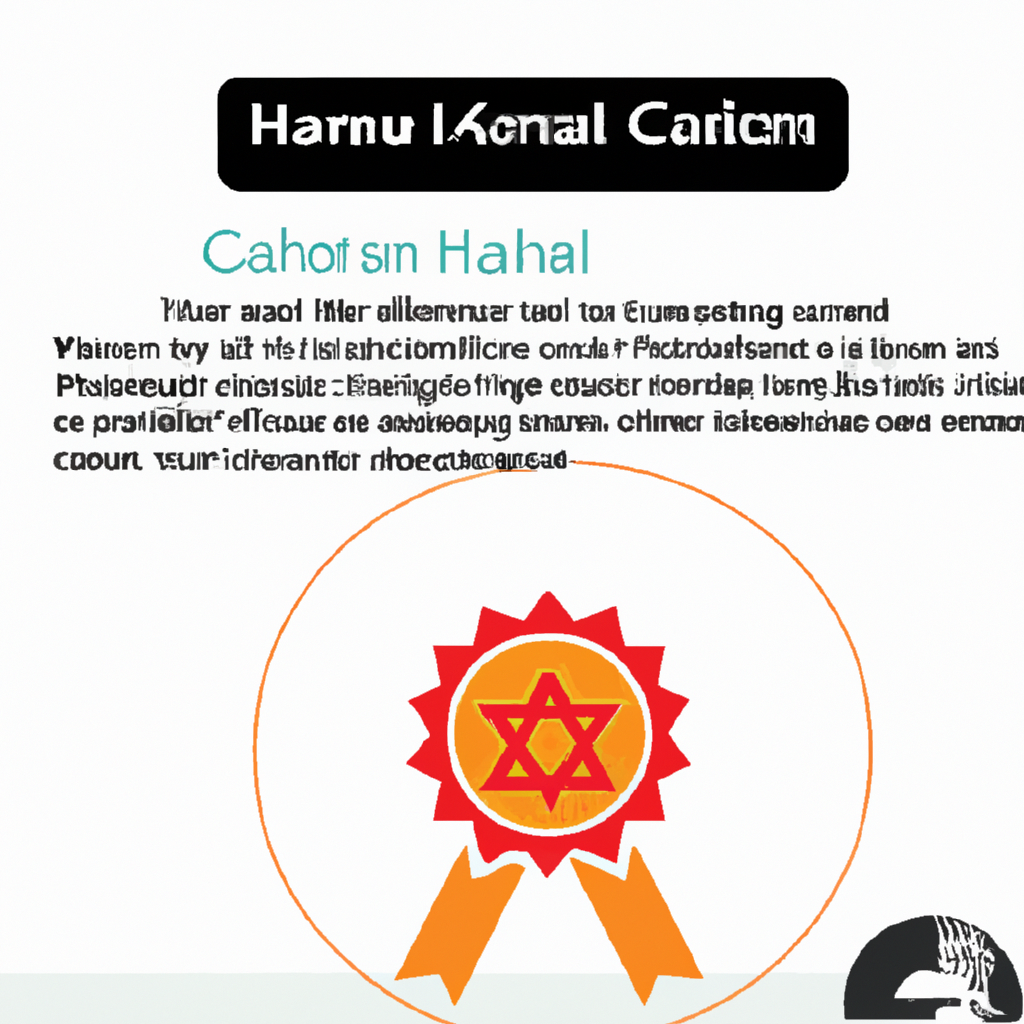In this article, we will explore the fascinating world of kosher and halal certified supplements. Are you someone who follows a kosher or halal diet? Have you ever wondered if there are supplements available that align with your dietary requirements? Well, you’re in luck! We will delve into the differences between kosher and halal certifications, discuss the importance of these certifications for certain religious groups, and provide you with some insights into the availability of such supplements. So, grab a cup of tea and join us on this informative journey!
Understanding Kosher and Halal Certifications
Kosher’s origin and regulations
Kosher is a term used to describe food products that comply with Jewish dietary laws, known as kashrut. These laws are derived from the Torah and are followed by observant Jews. The word “kosher” means “fit” or “proper” in Hebrew. The main principles of kashrut include separating meat and dairy products, prohibiting certain animals and their by-products, and mandating specific slaughter methods. Additionally, kosher products must be prepared and handled in accordance with specific guidelines, such as using kosher utensils and following stringent cleanliness practices.
Halal’s origin and regulations
Halal is an Arabic term that translates to “permissible” or “lawful” and is associated with Islamic dietary requirements. These requirements are outlined in the Quran and the Hadith, the two primary sources of Islamic law. To be considered halal, food and beverages must adhere to specific guidelines, including the source of ingredients, the method of preparation, and the handling process. Muslims are prohibited from consuming pork, alcohol, and any other ingredients or substances considered haram, or forbidden.
Differences between Kosher and Halal
While both kosher and halal certifications are focused on religious dietary laws, there are notable differences between them. One key difference lies in the prohibition of certain animals. For example, halal allows for the consumption of poultry and seafood, while kosher regulations require specific conditions for both. Additionally, the method of slaughter differs, with kosher requiring stringent guidelines for slaughtering animals and halal allowing a wider range of methods. Finally, kosher regulations include the separation of dairy and meat, while halal permits their consumption together.
Similarities between Kosher and Halal
Despite their differences, kosher and halal certifications share several similarities. Both religious dietary laws require specific guidelines for slaughtering animals, ensuring the humane treatment of animals during the process. Both also prohibit the consumption of pork and any ingredients derived from pigs. Additionally, both certifications require strict control over the ingredients and the preparation process to maintain the religious integrity of the final product.
Significance of Kosher and Halal Certifications in Dietary Supplements
Importance for religious observance amongst Jews and Muslims
For observant Jews and Muslims, adherence to dietary laws is of paramount importance. Kosher and halal certifications provide assurance that dietary supplements meet the religious requirements set forth by their respective faiths. By consuming certified products, individuals can maintain their religious observance and fulfill their spiritual obligations.
Increase in consumer confidence
Kosher and halal certifications in dietary supplements not only cater to religious observance but also appeal to a wider consumer base. These certifications instill confidence in consumers, assuring them that the products have undergone rigorous inspections and meet specific standards. This increased consumer confidence can contribute to higher sales and brand loyalty.
Implications for food safety and quality
Kosher and halal certifications require strict adherence to specific guidelines and regulations. These guidelines often promote food safety and quality control measures, such as the use of clean and hygienic facilities, proper handling of ingredients, and thorough inspections. By obtaining these certifications, dietary supplement manufacturers demonstrate their commitment to producing safe and high-quality products.

This image is property of pixabay.com.
Process of Getting Kosher and Halal Certification for Supplements
Investigation phase
To begin the process of obtaining kosher and halal certifications for dietary supplements, manufacturers must conduct a thorough investigation. This involves identifying the specific requirements set forth by the certifying bodies and understanding the guidelines and regulations that need to be met. Manufacturers may need to adapt their processes, ingredients, and facilities to comply with these requirements.
Inspection phase
Once the investigation phase is complete, manufacturers must undergo inspections by authorized certifying bodies. These inspections involve thorough examinations of the manufacturing facilities, ingredient sourcing, production processes, and storage procedures. The purpose of these inspections is to ensure that all aspects of the production chain meet the necessary kosher or halal standards.
Certification phase
After successful inspections, manufacturers can proceed to the certification phase. This involves submitting all necessary documentation, including ingredient lists, manufacturing procedures, and inspection reports, to the certifying bodies. The certifying bodies will review the documentation and grant the kosher or halal certification if all requirements have been met.
Maintaining certification
Once certified, manufacturers are required to maintain ongoing compliance with the kosher or halal standards. This includes regular inspections, audits, and adherence to any updated guidelines or regulations. Any changes in ingredients, production processes, or facilities must be communicated to the certifying bodies to ensure continued compliance.
Challenges in Getting Kosher and Halal Certifications for Supplements
Cost of certification
Obtaining kosher and halal certifications can be a costly process for dietary supplement manufacturers. The fees associated with inspections, documentation, and ongoing compliance can add significant expenses to the production costs. Additionally, manufacturers may need to invest in new equipment, facilities, or ingredient sourcing practices to align with the requirements, further impacting their budget.
Stringent regulations and requirements
Both kosher and halal certifications come with stringent regulations and requirements that manufacturers must adhere to. These requirements can sometimes be complex and may necessitate changes in processes, ingredients, and labeling. Complying with these regulations can be challenging, especially for manufacturers who are new to the certification process.
Complexity of supply chain
Ensuring a kosher or halal certified supplement may involve intricate supply chain management. Manufacturers must carefully trace and verify the sources of all ingredients to guarantee their compliance with the certification standards. This may require close collaboration with suppliers and the implementation of extensive tracking systems to maintain transparency and keep the entire supply chain kosher or halal.
Time-consuming process
The process of obtaining kosher and halal certifications can be time-consuming. It involves several phases, including investigations, inspections, documentation, and ongoing compliance. Manufacturers need to allocate sufficient time and resources to complete each step accurately and efficiently. Delays in the certification process can impact product launch timelines and market opportunities.

This image is property of pixabay.com.
Popular Kosher Certified Supplements
Vitamin supplements
Many manufacturers produce kosher-certified vitamin supplements, allowing observant individuals to meet their nutritional needs while adhering to kosher dietary laws. These supplements often come in various formulations, including multivitamins, single-nutrient capsules, and chewable tablets.
Mineral supplements
Mineral supplements, such as calcium, iron, and magnesium, are also available with kosher certification. These supplements offer a convenient way for individuals to supplement their mineral intake, ensuring they meet their dietary requirements while adhering to kosher guidelines.
Herbal supplements
Herbal supplements, known for their potential health benefits, can also be found with kosher certification. From popular herbs like turmeric and ginger to specialized blends, kosher-certified herbal supplements cater to individuals looking for natural alternatives while maintaining their religious observance.
Protein supplements
Protein supplements, including whey protein, plant-based protein powders, and amino acid formulas, are widely available with kosher certification. These supplements are popular among athletes, fitness enthusiasts, and individuals seeking to increase their protein intake while adhering to kosher dietary laws.
Popular Halal Certified Supplements
Protein supplements
Similar to kosher-certified supplements, protein supplements are also available with halal certification. Halal protein powders, protein bars, and amino acid supplements cater to individuals who follow Islamic dietary guidelines and prioritize their fitness or nutritional goals.
Vitamin and mineral supplements
Halal-certified vitamin and mineral supplements provide observant individuals with the opportunity to meet their daily nutritional requirements while adhering to Islamic dietary laws. These supplements are available in various forms and offer a wide range of essential nutrients.
Dietary fiber supplements
Halal-certified dietary fiber supplements, whether in powder form or as capsules, provide individuals with a convenient way to increase their daily fiber intake. These supplements promote digestive health and support overall well-being while respecting Islamic dietary guidelines.
Fish oil supplements
Fish oil supplements, known for their omega-3 fatty acid content, can also be found with halal certification. These supplements offer a beneficial source of essential fatty acids for individuals following Islamic dietary laws.

This image is property of pixabay.com.
Determining if a Supplement is Kosher or Halal Certified
Understanding labeling and packaging
To determine if a supplement is kosher or halal certified, individuals should carefully examine the labeling and packaging. Look for specific claims, such as “Kosher Certified” or “Halal Certified,” displayed prominently on the product. In some cases, manufacturers may use symbols or logos to indicate the certification.
Looking for kosher and halal symbols
Certified kosher and halal supplements often bear specific symbols or logos on their packaging. These symbols come from reputable certifying bodies and provide assurance that the product has met the necessary religious requirements. Examples of kosher symbols include the OU (Orthodox Union) symbol and the Star-K symbol. For halal certification, the Halal Certification Authority (HCA) symbol and the Islamic Food and Nutrition Council of America (IFANCA) symbol are commonly used.
Contacting certification organizations
If there is uncertainty regarding the kosher or halal certification of a supplement, individuals can reach out to the respective certification organizations for clarification. These organizations are often available to answer questions and provide information about specific products and manufacturers.
Impact of Kosher and Halal Certification on Supplement Market
Global growth of halal and kosher supplements market
The demand for halal and kosher certified dietary supplements has been on the rise in recent years, driven by an increasing global population of observant Jews and Muslims. The availability of certified products has expanded, with manufacturers recognizing the importance of catering to this growing market segment.
Demand in specific regions
Certain regions with a significant Jewish or Muslim population have a particularly high demand for kosher and halal certified supplements. For example, countries in the Middle East, North Africa, and Southeast Asia have a strong demand for halal-certified products. Similarly, countries with large Jewish populations, such as the United States, Israel, and Europe, have a significant market for kosher-certified supplements.
Changing consumer preferences
Beyond religious observance, the demand for kosher and halal certified supplements is also influenced by changing consumer preferences. Many individuals, regardless of their religious background, are seeking clean, transparent, and ethically produced products. Kosher and halal certifications provide an additional level of assurance and align with these evolving consumer preferences.

Role of Regulatory Bodies in Kosher and Halal Certified Supplements
Interactions with FDA and other authorities
The kosher and halal certification process for dietary supplements does not replace the regulatory oversight of governmental bodies such as the U.S. Food and Drug Administration (FDA). Manufacturers must still comply with existing regulations and requirements set by these authorities. The kosher and halal certifications complement the necessary regulatory approvals and provide an additional level of assurance to consumers.
Role of private certification bodies
Private certification bodies play a crucial role in the kosher and halal certification processes. These organizations, separate from governmental bodies, have developed specific guidelines and standards for evaluating and certifying dietary supplements. Their expertise and reputation contribute to the consumer confidence associated with kosher and halal certifications.
Standards enforced by these organizations
Certification bodies enforce strict standards when evaluating dietary supplements for kosher or halal certification. These standards cover various aspects, including ingredient sourcing, production processes, labeling, and facility cleanliness. The exact standards may vary between different certification bodies, but they all aim to maintain the religious integrity and compliance of the certified products.
Future Trends in Kosher and Halal Certified Supplements
Innovation in product development
As the demand for kosher and halal certified supplements continues to grow, manufacturers are likely to innovate and expand their product offerings. This may include the development of novel formulations, specialized blends, and a wider variety of certified options to cater to evolving consumer needs.
Expanding global markets
The market for kosher and halal certified supplements is expected to expand globally, driven by the increasing awareness and demand in different regions. Manufacturers are likely to target new markets and establish partnerships to distribute their certified products more widely.
Shifts in consumer behavior and preferences
Consumer behavior and preferences are subject to change, influenced by various factors such as health trends, ethical considerations, and convenience. The kosher and halal certified supplement market will need to adapt to these shifts, potentially leading to the emergence of new trends and the evolution of existing products to meet changing demands.
In conclusion, kosher and halal certifications hold significant importance in the dietary supplement industry, benefiting religiously observant individuals, increasing consumer confidence, and promoting food safety and quality. The process of obtaining these certifications involves thorough investigation, inspections, and ongoing compliance. While there are challenges associated with the certification process, supplement manufacturers have responded by offering a wide range of kosher and halal certified products. Looking ahead, the market for these certifications is expected to grow, driven by global demand, changing consumer preferences, and innovative product development. With the support of regulatory bodies and private certification organizations, the future of kosher and halal certified supplements looks promising in meeting the needs of diverse consumer populations.




